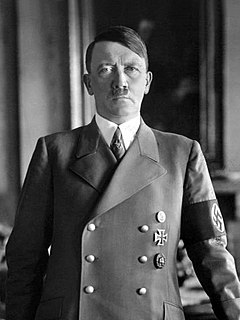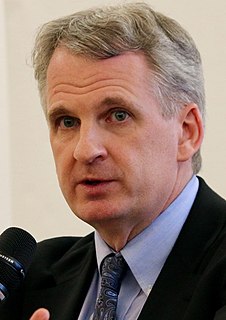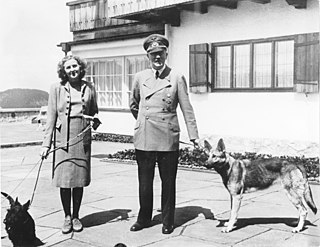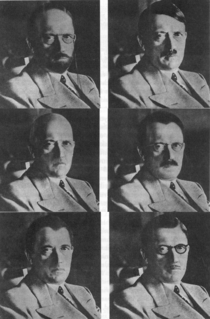 | |
| Author | A. N. Wilson |
|---|---|
| Language | English |
| Subject | Adolf Hitler |
| Published | 2012 |
| Media type | |
| Pages | 224 |
| LC Class | DD247.H5 |
Hitler: A Short Biography is a short biography of Adolf Hitler by A. N. Wilson, published by HarperCollins in 2012.
 | |
| Author | A. N. Wilson |
|---|---|
| Language | English |
| Subject | Adolf Hitler |
| Published | 2012 |
| Media type | |
| Pages | 224 |
| LC Class | DD247.H5 |
Hitler: A Short Biography is a short biography of Adolf Hitler by A. N. Wilson, published by HarperCollins in 2012.
The book was very unfavourably reviewed in the New Statesman by the historian Richard J. Evans, [1] who criticised various perceived factual errors and called it "valueless" (the review was subsequently shortlisted for the Hatchet Job of the Year award). The review sparked a feud between the two men. [2]

Heinrich Luitpold Himmler was Reichsführer of the Schutzstaffel, and a leading member of the Nazi Party of Germany. Himmler was one of the most powerful men in Nazi Germany and a main architect of the Holocaust.

Hermann Wilhelm Göring was a German politician, military leader and convicted war criminal. He was one of the most powerful figures in the Nazi Party, which ruled Germany from 1933 to 1945.

Nazi Germany was the German state between 1933 and 1945, when Adolf Hitler and the Nazi Party controlled the country, transforming it into a dictatorship. Under Hitler's rule, Germany quickly became a totalitarian state where nearly all aspects of life were controlled by the government. The Third Reich, meaning "Third Realm" or "Third Empire", alluded to the Nazi claim that Nazi Germany was the successor to the earlier Holy Roman Empire (800–1806) and German Empire (1871–1918). The Third Reich, which Hitler and the Nazis referred to as the Thousand-Year Reich, ended in May 1945 after just 12 years when the Allies defeated Germany, ending World War II in Europe.

David John Cawdell Irving is an English author and Holocaust denier who has written on the military and political history of World War II, with a focus on Nazi Germany. His works include The Destruction of Dresden (1963), Hitler's War (1977), Churchill's War (1987) and Goebbels: Mastermind of the Third Reich (1996). In his works, he argued that Adolf Hitler did not know of the extermination of Jews, or, if he did, he opposed it. Though Irving's negationist claims and views of German war crimes in World War II were never taken seriously by mainstream historians, he was once recognised for his knowledge of Nazi Germany and his ability to unearth new historical documents.

The New Statesman is a British political and cultural magazine published in London. Founded as a weekly review of politics and literature on 12 April 1913, it was at first connected with Sidney and Beatrice Webb and other leading members of the socialist Fabian Society, such as George Bernard Shaw, who was a founding director.
Andrew Norman Wilson is an English writer and newspaper columnist known for his critical biographies, novels and works of popular history. He is an occasional columnist for the Daily Mail and a former columnist for the London Evening Standard. He has been an occasional contributor to The Times Literary Supplement, New Statesman, The Spectator and The Observer.
Brendan Peter Simms is a Professor of the history of international relations in the Department of Politics and International Studies at the University of Cambridge.

Sir Richard John Evans is a British historian of 19th- and 20th-century Europe with a focus on Germany. He is the author of eighteen books, including his three-volume The Third Reich Trilogy (2003–2008). Evans was Regius Professor of History at the University of Cambridge from 2008 until his retirement in 2014, and President of Cambridge's Wolfson College from 2010 to 2017. He has been Provost of Gresham College in London since 2014. Evans was appointed Knight Bachelor for services to scholarship in the 2012 Birthday Honours.
John Adalbert Lukacs was a Hungarian-born American historian and author of more than thirty books. Lukacs was Roman Catholic. Lukacs described himself as a reactionary.
Philip Ball is a British science writer. For over twenty years he has been an editor of the journal Nature for which he continues to write regularly. He now writes a regular column in Chemistry World. He has contributed to publications ranging from New Scientist to the New York Times, The Guardian, the Financial Times and New Statesman. He is the regular contributor to Prospect magazine, and also a columnist for Chemistry World, Nature Materials and BBC Future. He has broadcast on many occasions on radio and TV, and in June 2004 he presented a three-part serial on nanotechnology, Small Worlds, on BBC Radio 4.

Adolf Hitler was an Austrian-born German politician who was dictator of Germany from 1933 until his death in 1945. He rose to power as the leader of the Nazi Party, becoming the chancellor in 1933 and then taking the title of Führer und Reichskanzler in 1934. During his dictatorship, he initiated World War II in Europe by invading Poland on 1 September 1939. He was closely involved in military operations throughout the war and was central to the perpetration of the Holocaust, the genocide of about six million Jews and millions of other victims.
A census in May 1939, six years into the Nazi era and after the annexation of mostly Catholic Austria and mostly Catholic Czechoslovakia into Germany, indicates that 54% of the population considered itself Protestant, 40% considered itself Catholic, 3.5% self-identified as Gottgläubig, and 1.5% as "atheist". Protestants voted for the Nazi Party and made up its membership more than Catholics did.

The religious beliefs of Adolf Hitler, dictator of Germany from 1933 to 1945, have been a matter of debate. His opinions regarding religious matters changed considerably over time. During the beginning of his political life, Hitler publicly expressed favorable opinions towards Christianity. Some historians describe his later posture as being "anti-Christian". He also criticized atheism.

Timothy David Snyder is an American historian specializing in the modern history of Central and Eastern Europe, who is the Richard C. Levin Professor of History at Yale University and a permanent fellow at the Institute for Human Sciences in Vienna. He has written several books, including the best-sellers Bloodlands: Europe Between Hitler and Stalin and On Tyranny: Twenty Lessons from the Twentieth Century. An expert on the Holocaust, Snyder is on the Committee on Conscience of the United States Holocaust Memorial Museum. He is also a member of the Council on Foreign Relations.

The sexuality of Adolf Hitler, dictator of Germany from 1933 to 1945, has long been a matter of historical and scholarly debate, as well as speculation and rumour. There is evidence that he had relationships with a number of women during his lifetime, as well as evidence of his antipathy to homosexuality, and no evidence of homosexual encounters. His name has been linked to a number of possible female lovers, two of whom committed suicide. A third died of complications eight years after a suicide attempt, and a fourth also attempted suicide.

Bloodlands: Europe Between Hitler and Stalin is a book by Yale historian Timothy D. Snyder that was first published by Basic Books on 28 October 2010. It is about mass murders committed during World War II in territories controlled by Nazi Germany and the Soviet Union.
Hatchet Job of the Year was a British journalism award given annually from 2012 to 2014 to "the writer of the angriest, funniest, most trenchant book review of the past twelve months". It was awarded by The Omnivore, a review aggregator website, with the aim to "raise the profile of professional critics and to promote integrity and wit in literary journalism". The prize was a year's supply of potted shrimp.
David Stahel is a historian, author and senior lecturer in history at the University of New South Wales. He specialises in German military history of World War II. Stahel has authored several books on the military operations of the first six months of the Eastern Front, including on the launching of Operation Barbarossa, the Battle of Kiev (1941) and the Battle for Moscow.

Conspiracy theories about the death of Adolf Hitler, dictator of Germany from 1933 to 1945, contradict the accepted fact that he committed suicide in the Führerbunker on 30 April 1945. Stemming from a campaign of Soviet disinformation, most of these theories hold that Hitler and his wife, Eva Braun, survived and escaped from Berlin, with some asserting that he went to South America. In the post-war years, the United States Federal Bureau of Investigation (FBI) and Central Intelligence Agency (CIA) investigated some of the reports, without lending them credence. The 2009 revelation that a skull in the Soviet archives long (dubiously) claimed to be Hitler's actually belonged to a woman has helped fuel conspiracy theories.

The Churchill Factor: How One Man Made History is a book by British politician, journalist and former Prime Minister of the United Kingdom, Boris Johnson, in which he details the life of former Prime Minister Sir Winston Churchill. It was originally published on 23 October 2014 by Hodder & Stoughton.